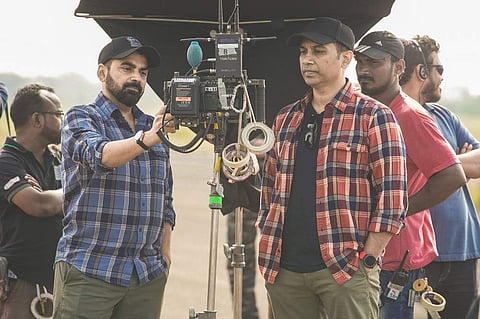
- LIFESTYLE
- FASHION
- FOOD
- ENTERTAINMENT
- EVENTS
- CULTURE
- VIDEOS
- WEB STORIES
- GALLERIES
- GADGETS
- CAR & BIKE
- SOCIETY
- TRAVEL
- NORTH EAST
- INDULGE CONNECT

When Raj and DK set out to tell the story about a middle-class government employee who works as a secret agent, little did they know that they would be creating a phenomenon in the OTT space. The filmmakers behind out-of-the-box comedies such as Go Goa Gone and Stree, and the crime drama Shor In The City, created The Family Man — Srikant Tiwari, an agent who foils plans of criminals and terrorist organisations, while also trying to be a responsible husband and father. Ever since Season 1 of the show dropped in 2019, the audience has been waiting with bated breath for Season 2. The new season took a while to release on the platform — Amazon Prime Video — courtesy COVID-19. “It was a mammoth task to work on Season 2. It was a big challenge to live up to people’s expectations after Season 1 and then COVID struck. We were struggling to complete post-production, and there were also a few scenes left to shoot,” explains Raj. There was further delay, and when the trailer released in May, there were objections from many individuals and organisations about the portrayal of the Tamil Eelam rebels. However, the series finally went on air on June 4.
Staying neutral
Stories about war, rebellion, and conflict never die. They are always repeated and told from a different perspective. With The Family Man, Raj and DK offer a fictionalised story that’s set in the present. Though questions have been raised about the subject and the storyline, the makers are clear about what they wanted to achieve. “We were not keen on making anything political. We always try to tell human stories. The Family Man has a certain geo-political context to it. But it’s not a political thriller,” explains DK. Raj further clarifies that political dynamics is not the scope of their fictitious story. “We haven’t set out to make a political statement. That is not our style of filmmaking and there is no intent to project certain things that are either misrepresented or overrepresented, or which will skew the balance. The show is called The Family Man because it is about a family man, who is juggling his professional and personal life. Most of the elements shown are part of the plot and are incidental. We wanted to make sure that the projection is balanced, and that we don’t take sides,” he says.
Going national
There’s more to the story beyond the primar y subjects of the conflict and Manoj Bajpayee’s character as Srikant Tiwari, the TASC agent. What happens to those who are victims of such strife, and how does one stay detached despite the atrocities meted out to them? Raji’s character is an attempt at giving a face to such victims. But the creators say they were conscious of what they were creating and had their research in place before they put their story on paper. “We had a Sri Lankan Tamil writer on board who was providing the context and emotional core of the characters and helping with the language. We believe that if we are doing something, we do it right. We don’t mess around with cultures,” says DK. At the same time, the narrative highlights the diversity of cultures and its nuances with a touch of humour. When JK’s character mispronounces medu vada, or assumes that everyone uses the word ‘rascala’ in South India, he is snubbed by his colleague Muthu who is from Chennai. “The show’s premise lets you explore India from everyone’s perspective. We are going beyond the borders of Hindi cinema, and looking at the country as a whole,” says Raj.
Women at the centre
The female characters created by Raj and DK have always been strong. Whether it was Radhika Apte’s Sapna in Shor In The City, or Priyamani’s Suchi in The Family Man, they have always presented intelligent and distinct roles for women. Even Dhriti, Srikant’s teenage daughter is not afraid to speak her mind, in Season 2. “We take it as a compliment when we hear that we have etched out really strong female characters,” says Raj. Raj goes onto explain that nobody really taught him to respect women, it was something he observed at home. “My mother has five sisters, each one of them is stronger than the next. They are all self-made women. There are singers, artists and professors. Nobody specifically told me to be nice to a girl, we observed and learnt from the environment at home,” he shares. DK was raised by a single mother, and reveals that she was the biggest influence on him and his sister. “I lost my father when I was 14. My mother was the sole breadwinner of the family then. She actually went from being a homemaker to a working woman,” he says.
On the work front, the duo has been busy writing more scripts, and basking in the success of not just The Family Man, but also of their Telugu OTT production Cinema Bandi. “The OTT format has given us a lot of freedom to explore our art. But we are essentially filmmakers and want to see our movies in theatres. We have four scripts ready, and two of them are ready with the cast, we are just waiting for the right time to begin shooting,” says Raj. Among their most-awaited projects is the Hindi version of Citadel, which the duo is working on along with American filmmakers — Anthony Russo and Joseph Russo aka Russo brothers.
Watch: The Family Man 2: Raj & DK Unplugged
ayeshatabassum@newindianexpress.com
@aishatax